Tree Service Villanova
Best Tree Service Company in Villanova
Get 3 FREE Tree Care quotes for your project today! Compare profiles, reviews, accreditations, portfolio, etc... and choose the best service.

Belles Tree Service
4.1125 reviews1205 E Emmaus Ave, Allentown, PA, 18103, USServing the community for over 45 years, Belles Tree Service is a Pennsylvania-based tree service company that has been providing quality tree care for 45 years and across multiple family generations. From tree planting to tree removal and crane service to emergency service, let us help you make the most of your outdoor space.
- Services
- Why Us?
- Accreditations
- Our Team
- Testimonials
- Gallery
Get Quote
Strunk Tree Service, Inc.
3.542 reviewsStroudsburg, PA, 863 Haney Rd, 18360, USStrunk Tree Service is a family-owned, 2nd generation business, headed toward our 3rd generation in service! We offer exceptional services ranging from tree removal to landscaping services. Our team of experts will keep your trees looking healthy and free of bugs. We cover everything from tree trimming to storm damage clean-up.
- Services
- Why Us?
- Accreditations
- Our Team
- Testimonials
- Gallery
Get Quote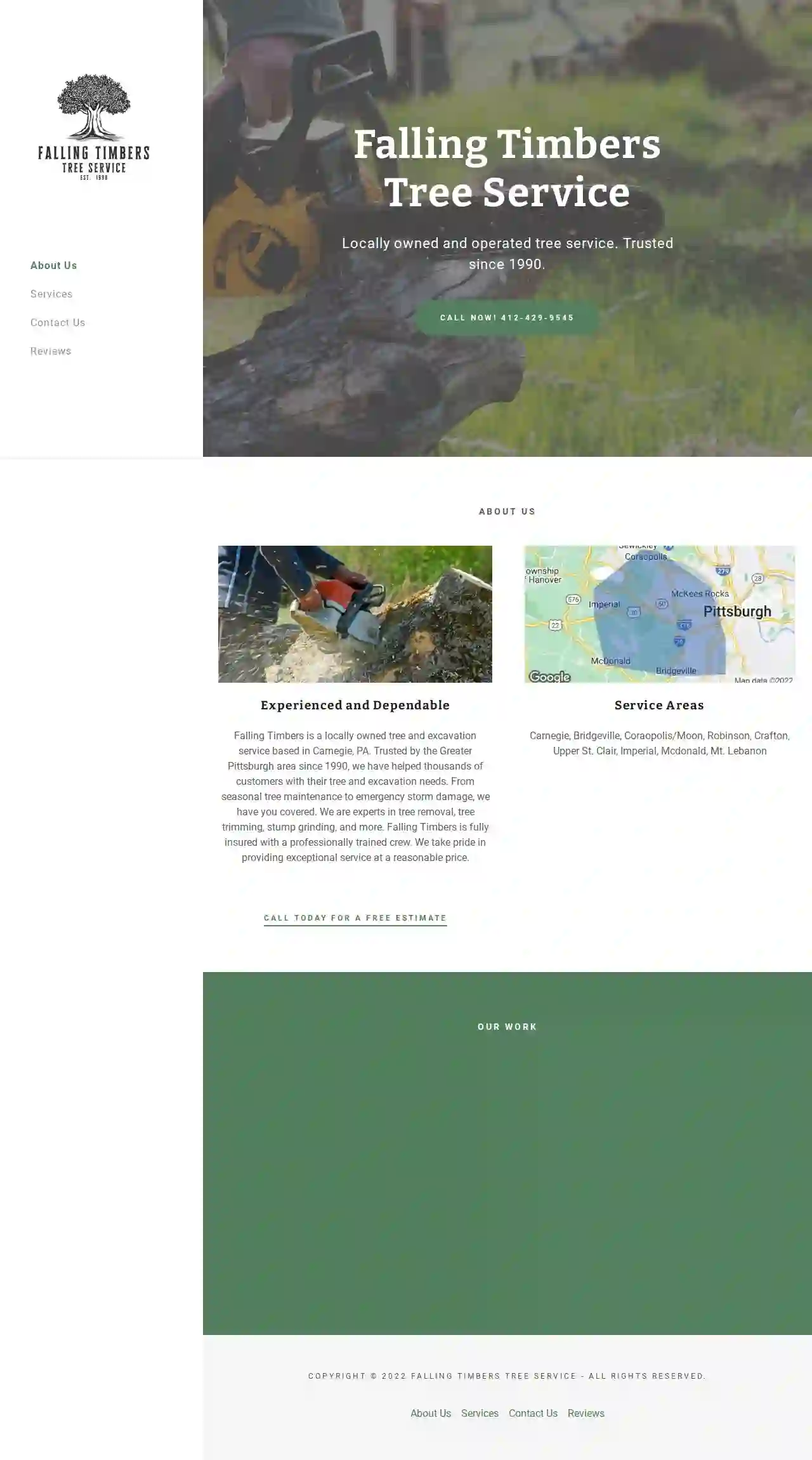
Falling Timbers Tree Services
4.69 reviewsCarnegie, PA, 15205, USFalling Timbers is a locally owned tree and excavation service based in Carnegie, PA. Trusted by the Greater Pittsburgh area since 1990, we have helped thousands of customers with their tree and excavation needs. From seasonal tree maintenance to emergency storm damage, we have you covered. We are experts in tree removal, tree trimming, stump grinding, and more. Falling Timbers is fully insured with a professionally trained crew. We take pride in providing exceptional service at a reasonable price.
- Services
- Why Us?
- Testimonials
- Gallery
Get Quote
Liberty Tree Service
4.771 reviews1760 County Line Road, Huntingdon Valley, PA, 19006, USTransforming and Maintaining Your Property’s Trees Since 2001. Call Today, We’ll Respond Right Away. Your Local Tree Care Specialists With Over 25 Years of Experience Caring for Native Trees Throughout the Region. With a commitment to excellence and over two decades of experience, Liberty Tree Service in Huntingdon Valley, PA, has become a trusted partner for residential and commercial customers needing expert tree care service. From tree removal and stump grinding to pruning and storm damage cleanup, our team of professionals has the expertise and equipment to tackle any project with precision and efficiency so you can focus on the things that really matter. If you're ready to enhance the beauty and health of your property's trees, give us a call today at 215-322-8535 to speak with one of our dedicated experts.
- Services
- Why Us?
- Accreditations
- Our Team
- Testimonials
- Gallery
Get Quote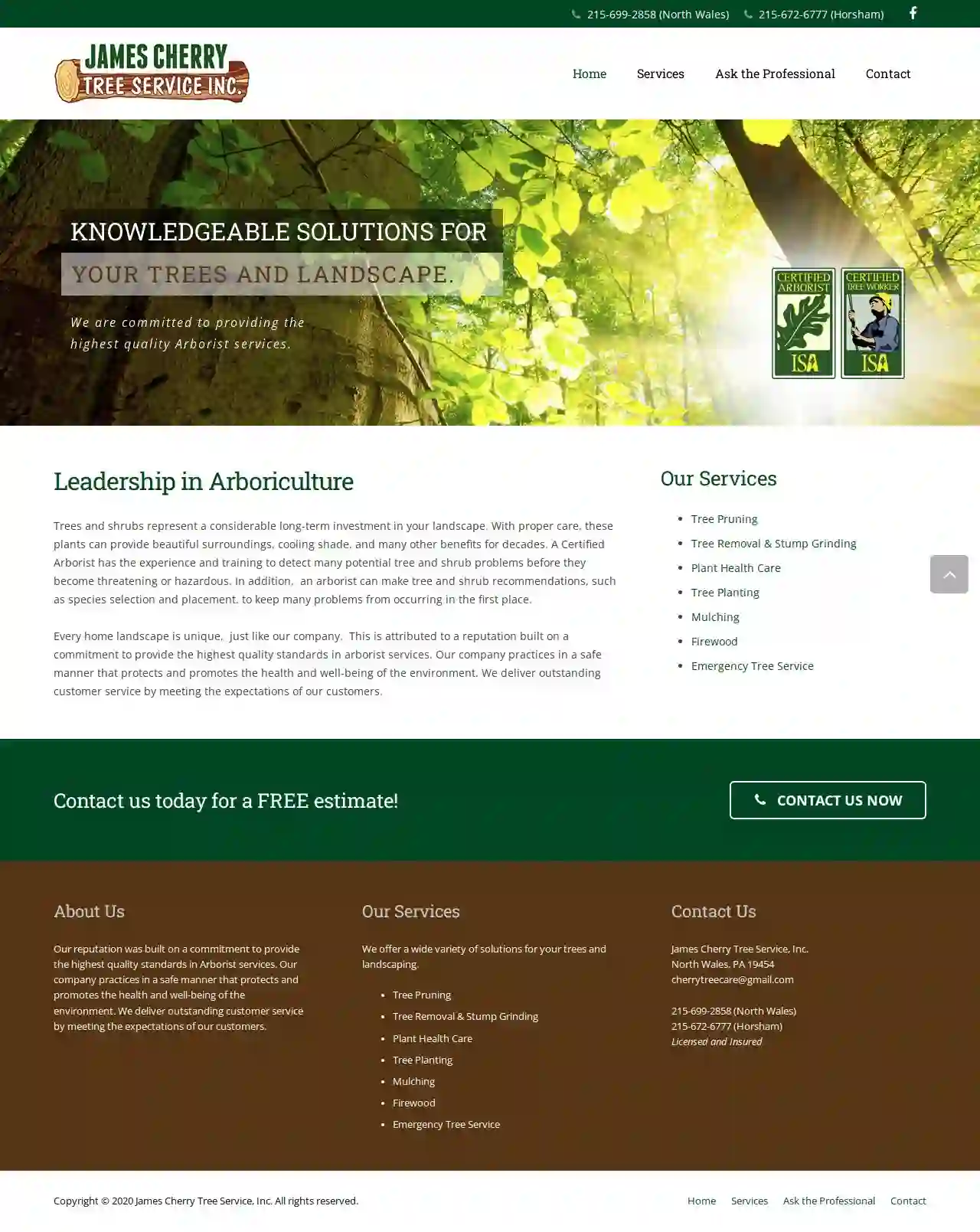
James Cherry Tree Service Inc.
516 reviewsNorth Wales, PA, 19454, USJames Cherry Tree Service, Inc. is a reputable company that offers a wide variety of solutions for your trees and landscaping. Our reputation was built on a commitment to provide the highest quality standards in Arborist services. We practice in a safe manner that protects and promotes the health and well-being of the environment. We deliver outstanding customer service by meeting the expectations of our customers.
- Services
- Why Us?
- Accreditations
- Gallery
Get Quote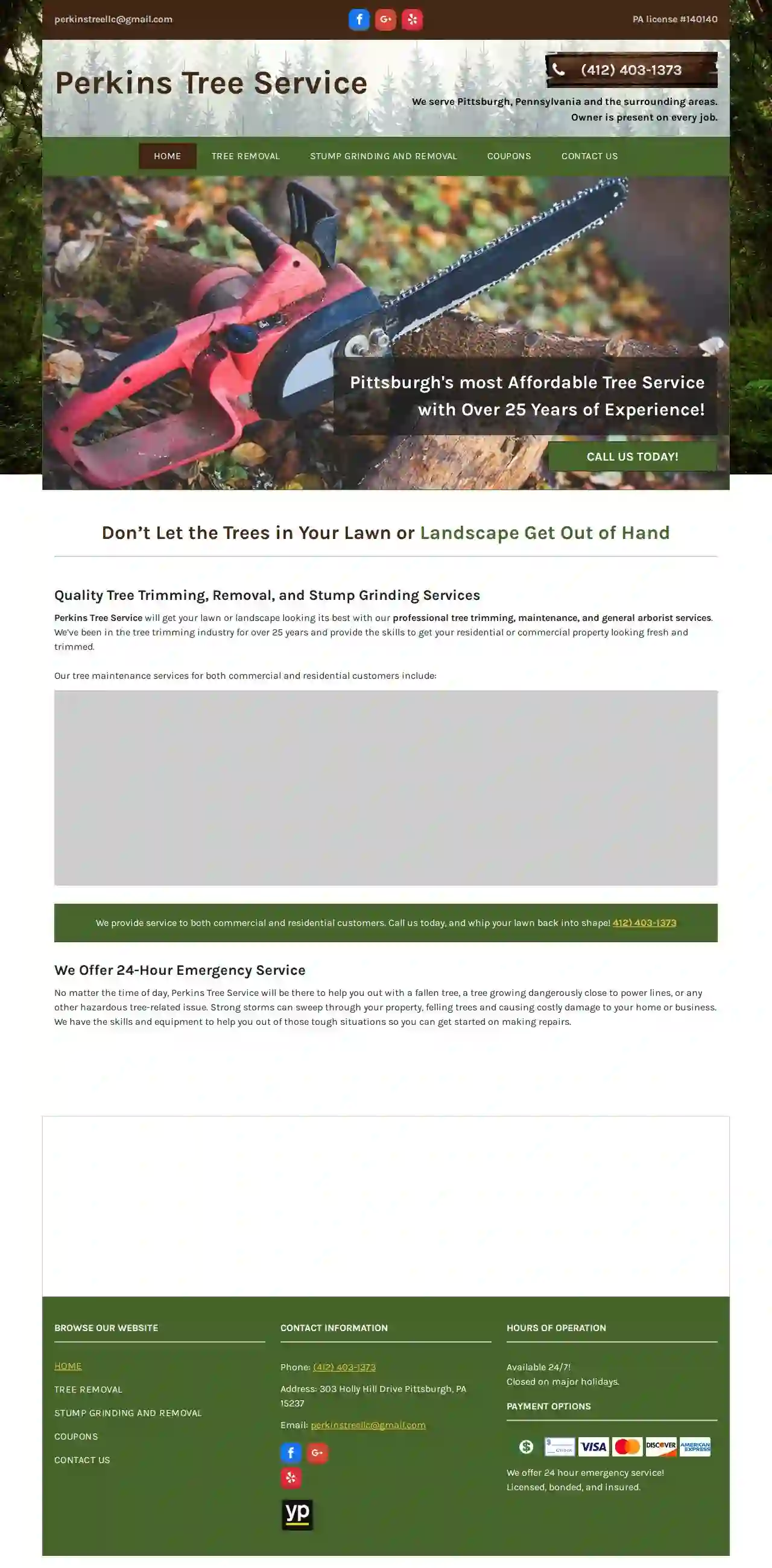
Perkins Tree Service
4.852 reviews303 Holly Hill Drive, Pittsburgh, 15237, USPerkins Tree Service is a professional tree trimming, maintenance, and general arborist service with over 25 years of experience. They provide services to both commercial and residential customers, including tree removal, tree trimming & thinning, stump grinding & removal, general arborist services, shrub trimming & removal, and bucket truck service. They offer 24-hour emergency service and are licensed, bonded, and insured.
- Services
- Why Us?
- Accreditations
- Gallery
Get Quote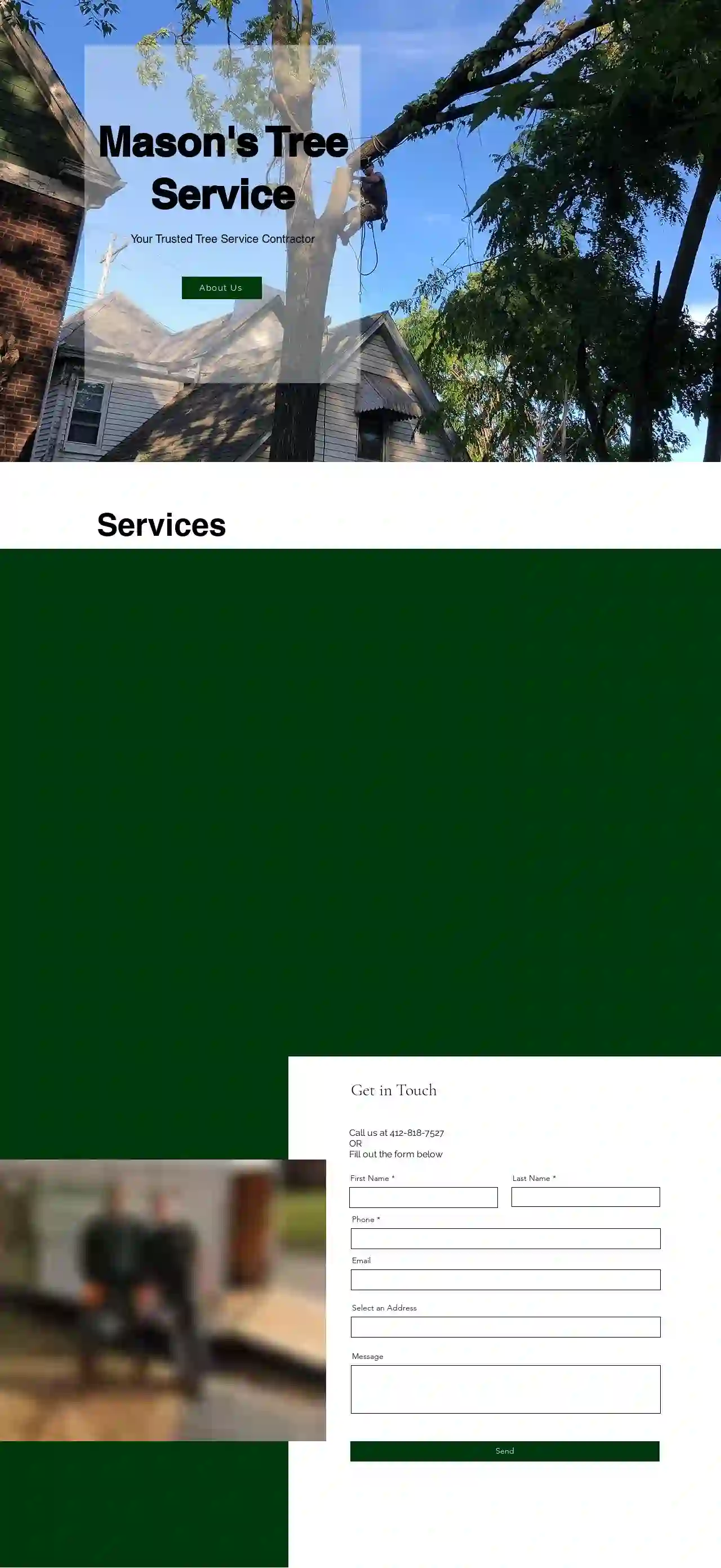
MASON’S TREE SERVICE
4.718 reviews123 Main St, Suite 100, Pittsburgh, 15201, USMason's Tree Service is a trusted tree service contractor offering a variety of services including tree removal, stump removal, pruning, trimming, emergency service, lot clearing, and shrubbery removal. With a focus on customer satisfaction, Mason's Tree Service aims to provide top-quality services to meet all your tree care needs.
- Services
- Why Us?
- Accreditations
- Our Team
- Testimonials
- Gallery
Get Quote
Scranton Tree Service
24 reviewsScranton, PA, 705 Greenridge Street, 18509, USScranton Tree Service is a locally owned and operated company proudly serving Scranton and nearby towns, cities, and boroughs. We are fully insured and qualified to address all of your tree service needs. Our professional services are only outdone by our customer satisfaction. We proudly serve Northeastern Pennsylvania and neighboring cities, providing the best tree removal services, stump grinding, and stump removal in the area.
- Services
- Why Us?
- Accreditations
- Our Team
- Testimonials
- Gallery
Get Quote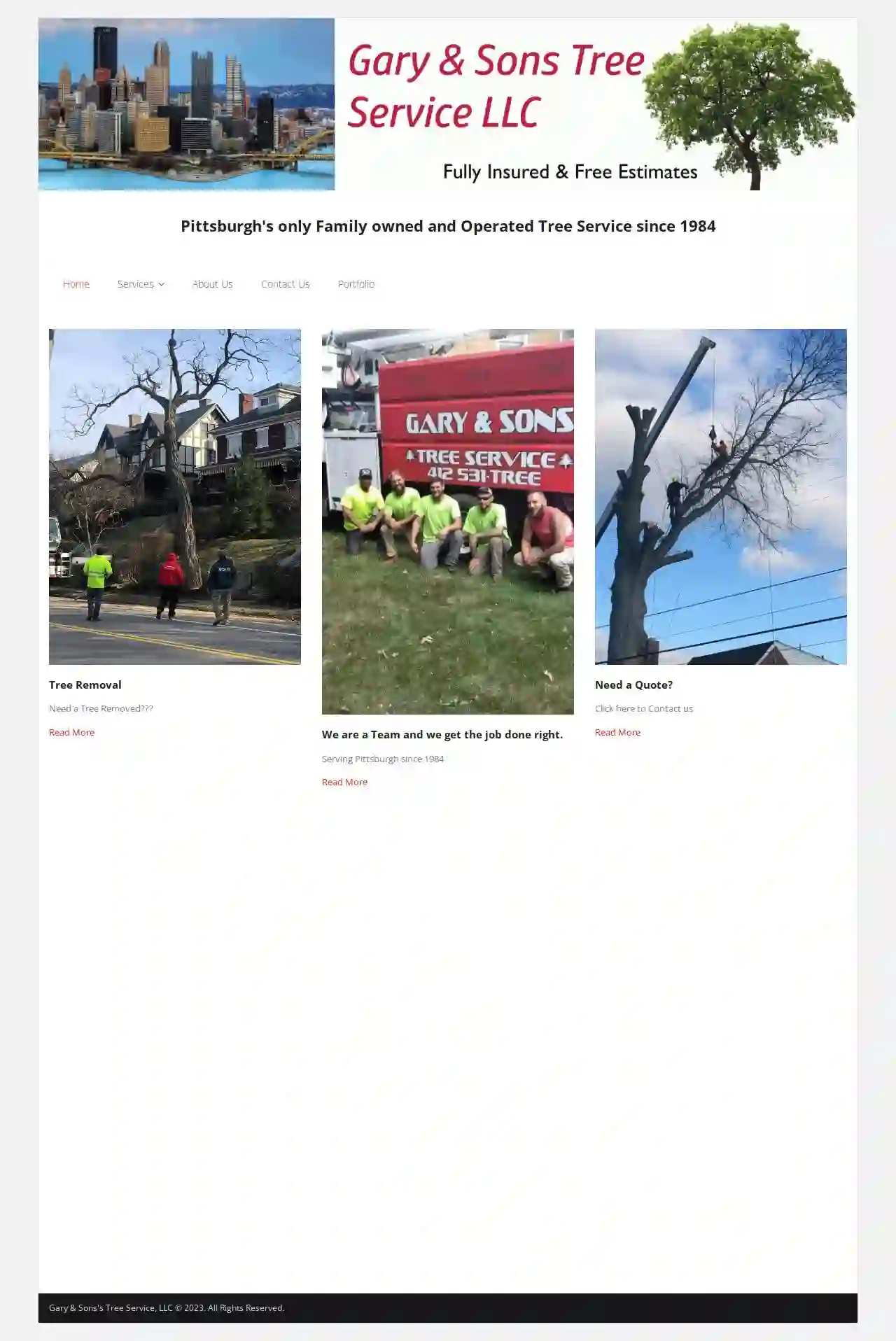
Gary & Sons Tree Service LLC
4.252 reviewsPittsburgh, USPittsburgh's only Family owned and Operated Tree Service since 1984. We offer a variety of services including Tree Removal, Tree Pruning, Stump Grinding, and Concrete Work. Our team is dedicated to providing top-notch service and ensuring customer satisfaction.
- Services
- Why Us?
- Gallery
Get Quote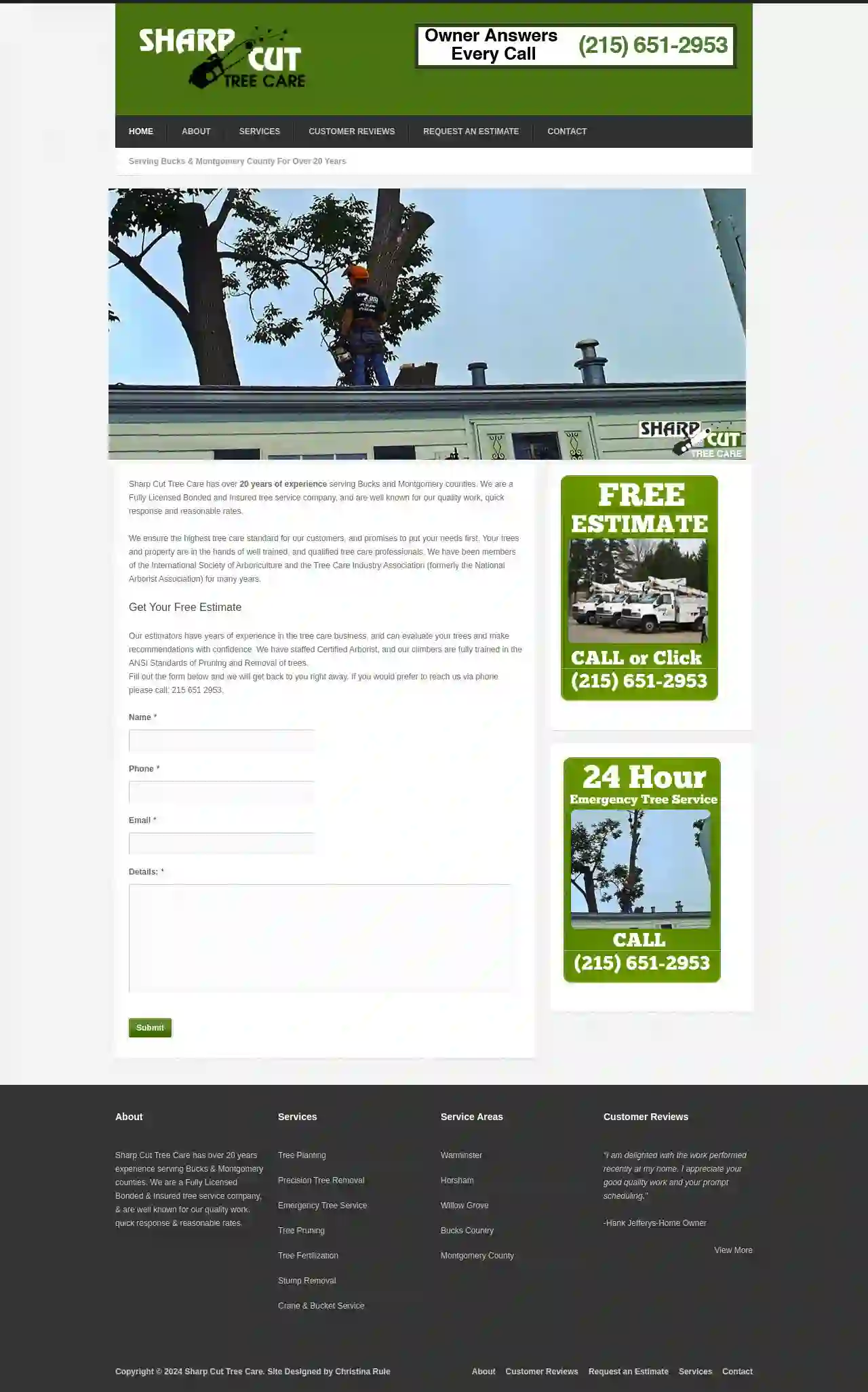
Sharp Cut Tree Care
4.718 reviews1234 Main St, Suite 101, Warminster, 18974, USSharp Cut Tree Care has over 20 years of experience serving Bucks and Montgomery counties. We are a Fully Licensed Bonded and Insured tree service company, and are well known for our quality work, quick response and reasonable rates. We ensure the highest tree care standard for our customers, and promises to put your needs first. Your trees and property are in the hands of well trained, and qualified tree care professionals. We have been members of the International Society of Arboriculture and the Tree Care Industry Association (formerly the National Arborist Association) for many years.
- Services
- Why Us?
- Accreditations
- Our Team
- Testimonials
- Gallery
Get Quote
Over 16,467+ Arborists registered
Our tree service contractors operate in Villanova and beyond!
TreeServiceMatch has curated and vetted the Best Tree Surgeons arround Villanova. Find a trustworthy pro today.
Frequently Asked Questions About Tree Services
- Tree species: Some tree species have harder, more decay-resistant wood than others.
- Climate: Warm, humid climates accelerate decomposition, while cold, dry climates slow it down.
- Moisture: Stumps in moist soil or those exposed to regular rainfall will decompose faster than those in dry conditions.
- Insect and Fungal Activity: Insects and fungi play a crucial role in breaking down wood. Stumps that are accessible to these organisms will rot faster.
- Dormant Season (Late Fall to Early Spring): This is generally the best time to trim most deciduous trees (those that lose their leaves in fall) as they are not actively growing. Trimming during dormancy reduces stress on the tree and allows for better wound closure.
- Spring: Light pruning and shaping can be done in spring before the tree's leaves fully emerge.
- Summer: Trimming can be done in summer to remove dead or diseased branches. However, avoid heavy pruning during hot weather, as it can stress the tree.
- Fall: Some light pruning can be done in fall after the leaves have fallen, but it's best to avoid major pruning before winter.
- Tree Protection Zone (TPZ): Establish a designated area around the trees that is off-limits to construction activities. The size of the TPZ depends on the tree's size and species, but generally, it should extend to the drip line (the outermost edge of the tree's canopy).
- Root Protection: Avoid digging, trenching, or compacting the soil within the TPZ. If excavation is necessary, use hand digging or air spading to minimize root disturbance.
- Trunk Protection: Protect tree trunks from damage by wrapping them with protective barriers, such as burlap or plywood.
- Branch Protection: Avoid cutting or damaging branches unless absolutely necessary. If pruning is required, have it done by a certified arborist.
- Watering: Ensure trees receive adequate water during construction, especially if the soil has been disturbed or compacted.
- Monitoring: Regularly monitor trees for signs of stress or damage during and after construction.
- Experience and qualifications: 'How long have you been in business? Are your arborists certified? What experience do you have with similar projects?'
- Licensing and insurance: 'Are you licensed and insured? Can you provide proof of insurance?'
- Safety practices: 'What safety measures do you take to protect your workers and my property during the project?'
- Cleanup and disposal: 'What will you do with the tree debris after the job? Will you remove the stump and clean up the work area?'
- References: 'Can you provide references from previous clients?'
- Written estimates: 'Can you provide a detailed written estimate outlining the scope of work, costs, and timeframe?'
How long does it take for a tree stump to rot?
What is the best time of year to trim trees?
What is the best way to protect trees during construction?
What questions should I ask a tree service company?
How long does it take for a tree stump to rot?
- Tree species: Some tree species have harder, more decay-resistant wood than others.
- Climate: Warm, humid climates accelerate decomposition, while cold, dry climates slow it down.
- Moisture: Stumps in moist soil or those exposed to regular rainfall will decompose faster than those in dry conditions.
- Insect and Fungal Activity: Insects and fungi play a crucial role in breaking down wood. Stumps that are accessible to these organisms will rot faster.
What is the best time of year to trim trees?
- Dormant Season (Late Fall to Early Spring): This is generally the best time to trim most deciduous trees (those that lose their leaves in fall) as they are not actively growing. Trimming during dormancy reduces stress on the tree and allows for better wound closure.
- Spring: Light pruning and shaping can be done in spring before the tree's leaves fully emerge.
- Summer: Trimming can be done in summer to remove dead or diseased branches. However, avoid heavy pruning during hot weather, as it can stress the tree.
- Fall: Some light pruning can be done in fall after the leaves have fallen, but it's best to avoid major pruning before winter.
What is the best way to protect trees during construction?
- Tree Protection Zone (TPZ): Establish a designated area around the trees that is off-limits to construction activities. The size of the TPZ depends on the tree's size and species, but generally, it should extend to the drip line (the outermost edge of the tree's canopy).
- Root Protection: Avoid digging, trenching, or compacting the soil within the TPZ. If excavation is necessary, use hand digging or air spading to minimize root disturbance.
- Trunk Protection: Protect tree trunks from damage by wrapping them with protective barriers, such as burlap or plywood.
- Branch Protection: Avoid cutting or damaging branches unless absolutely necessary. If pruning is required, have it done by a certified arborist.
- Watering: Ensure trees receive adequate water during construction, especially if the soil has been disturbed or compacted.
- Monitoring: Regularly monitor trees for signs of stress or damage during and after construction.
What questions should I ask a tree service company?
- Experience and qualifications: 'How long have you been in business? Are your arborists certified? What experience do you have with similar projects?'
- Licensing and insurance: 'Are you licensed and insured? Can you provide proof of insurance?'
- Safety practices: 'What safety measures do you take to protect your workers and my property during the project?'
- Cleanup and disposal: 'What will you do with the tree debris after the job? Will you remove the stump and clean up the work area?'
- References: 'Can you provide references from previous clients?'
- Written estimates: 'Can you provide a detailed written estimate outlining the scope of work, costs, and timeframe?'